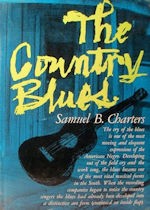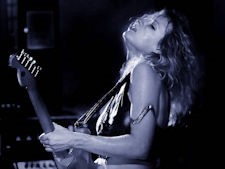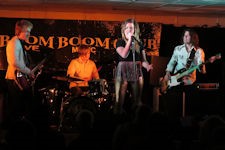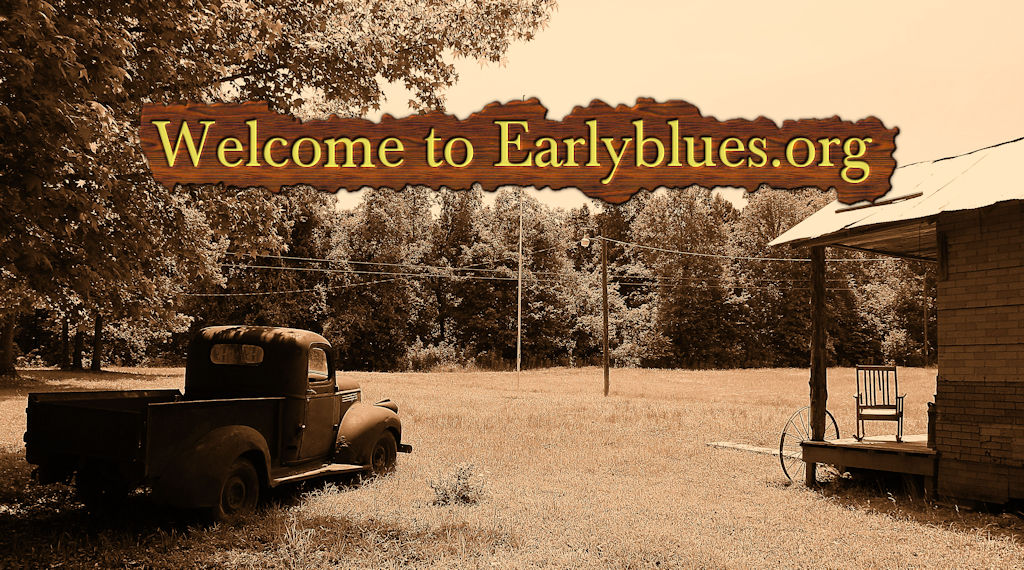‘What is the Blues?’
Definition / meaning of the blues and what does the blues mean to you? – compiled by Alan White
What Is The Blues?
“It starts with the sound, the totality of the performance. A sound so unlike anything else that it fascinates from the first hearing, stirs recognition and a sympathy the listener didn’t know he possessed. The words don’t register at first, not at least on a conscious level, but the emotion does. The message is often simple, so simple that graduations of meaning only become apparent after the initial intrigue has subsided. The emotion can be palpable, so much so that when set alongside other forms of music, it seems as histrionic as grand opera. You’ve discovered the blues”.
– Neil Slaven, author, record producer and leading authority on the blues
So, what is the blues? A question often asked but can anyone define the blues, the meaning of the blues?
“Blues is such a protean and flexible mode of expression that it almost defies any attempt to pin it down with a concise definition. …. For some people the blues can be defined by the example of a single song or a single personality. Such simplistic definitions don’t get us very far….. blues attracts many different personalities, has had many great and creative artistic figures over the years, expresses many moods and subjects, and occurs in many different styles”.
– David Evans, Professor of Music, University of Memphis, blues researcher, author and director of ethnomusicology specialising in southern UK folk and popular music. (Source: The National Public Radio Curious Listener’s Guide to Blues, published by Perigree Books).
Well, to delve a little deeper, let’s start by taking a look at some early definitions from authoritative authors / books on the subject …
Firstly from the very first book to be published on ‘blues music’ – the emotional view:
 ‘The Country Blues’ by Sam Charters, Published by Rinehart, 1959.
‘The Country Blues’ by Sam Charters, Published by Rinehart, 1959.
A Music “… Extraordinarily Wild and Unaccountable”, the opening paragraph starts (slightly edited with more acceptable terms than in 1959):
“The blues, as a distinctive musical form, is probably not much older than the years before the First World War, but the style and emotions of the blues have been a part of the music of the African American in America for over 150 years. A blues is a personal song, with intense personal emotional characteristics. The blues became the emotional outlet for African American singers in every part of the South, and as the rich confusion of music from the fields began to fall into loose patterns, the blues became a part of the fabric of African American life itself”.
Secondly from the second book to be published on ‘blues music’ – the more technical view:
 ‘Blues Fell this Morning: The Meaning of the Blues’ by Paul Oliver, first edition published by Cassell, 1960 (second edition published by Cambridge University Press, 1990).
‘Blues Fell this Morning: The Meaning of the Blues’ by Paul Oliver, first edition published by Cassell, 1960 (second edition published by Cambridge University Press, 1990).
“Blues is the name given to both a musical form and a music genre that originated in African-American communities of primarily the Deep South of the United States at the end of the 19th century from spirituals, work songs, field hollers, shouts and chants, and rhymed simple narrative ballads. The blues form, ubiquitous in jazz, rhythm and blues, and rock and roll, is characterized by specific chord progressions, of which the twelve-bar blues chord progression is the most common. The blue notes that, for expressive purposes are sung or played flattened or gradually bent (minor 3rd to major 3rd) in relation to the pitch of the major scale, are also an important part of the sound. The blues genre is based on the blues form but possesses other characteristics such as specific lyrics, bass lines and instruments. Blues can be subdivided into several subgenres ranging from country to urban blues that were more or less popular during different periods of the 20th century. Best known are the Delta, Piedmont, Jump and Chicago blues styles. World War II marked the transition from acoustic to electric blues and the progressive opening of blues music to a wider audience. In the 1960s and 1970s, a hybrid form called blues-rock evolved. The term “the blues” refers to the “blue devils”, meaning melancholy and sadness; an early use of the term in this sense is found in George Colman’s one-act farce Blue Devils Though the use of the phrase in African-American music may be older, it has been attested to since 1912, when Hart Wand’s “Dallas Blues” became the first copyrighted blues composition. In lyrics the phrase is often used to describe a depressed mood”.
Since then there have of course been various eminent works on the subject of the blues over the years but what are the modern views? How is ‘the blues’ or ‘meaning of the blues’ or even ‘what the blues means to me’ defined or viewed today?
Let’s start at looking at modern day views by taking a look at what Wikipedia says about ‘The Blues’:
“Blues is a music genre and musical form originated by African Americans in the Deep South of the United States around the end of the 19th century. The genre developed from roots in African musical traditions, African-American work songs, spirituals, and European folk music. Blues incorporated spirituals, work songs, field hollers, shouts, chants, and rhymed simple narrative ballads. The blues form, ubiquitous in jazz, rhythm and blues and rock and roll, is characterized by the call-and-response pattern, the blues scale and specific chord progressions, of which the twelve-bar blues is the most common. Blue notes (or “worried notes”), usually thirds or fifths flattened in pitch, are also an essential part of the sound. Blues shuffles or walking bass reinforce the trance-like rhythm and form a repetitive effect known as the groove.
Blues as a genre is also characterized by its lyrics, bass lines, and instrumentation. Early traditional blues verses consisted of a single line repeated four times. It was only in the first decades of the 20th century that the most common current structure became standard: the AAB pattern, consisting of a line sung over the four first bars, its repetition over the next four, and then a longer concluding line over the last bars. Early blues frequently took the form of a loose narrative, often relating the racial discrimination and other challenges experienced by African-Americans.
Many elements, such as the call-and-response format and the use of blue notes, can be traced back to the music of Africa. The origins of the blues are also closely related to the religious music of the Afro-American community, the spirituals. The first appearance of the blues is often dated to after the ending of slavery and, later, the development of juke joints. It is associated with the newly acquired freedom of the former slaves. Chroniclers began to report about blues music at the dawn of the 20th century. The first publication of blues sheet music was in 1908. Blues has since evolved from unaccompanied vocal music and oral traditions of slaves into a wide variety of styles and subgenres. Blues subgenres include country blues, such as Delta blues and Piedmont blues, as well as urban blues styles such as Chicago blues and West Coast blues. World War II marked the transition from acoustic to electric blues and the progressive opening of blues music to a wider audience, especially white listeners. In the 1960s and 1970s, a hybrid form called blues rock developed, which blended blues styles with rock music”.
Next, another (summarised) view of ‘the blues’ from the ’mojohand’ website (www.mojohand.com):
“Blues is an African-American music that traverses a wide range of emotions and musical styles. “Feeling blue” is expressed in songs whose verses lament injustice or express longing for a better life and lost loves, jobs, and money. But blues is also a raucous dance music that celebrates pleasure and success. Central to the idea of blues performance is the concept that, by performing or listening to the blues, one is able to overcome sadness and lose the blues…. Blues remains with us in contemporary American culture, and as a traditional musical form it has been subjected to countless revivals and reinterpretations. Its current practitioners often integrate the sounds and instrumental pyrotechnics of rock music and the sheen of urban soul; but the twelve-bar form, variations on the blues chord progression, and emotive lyrical content remain relatively unchanged”.
Now let’s take a look at some quotes from blues artists and their various takes on the blues, either from publications or personal interviews:
‘What the Blues Means to Me’ by Doug MacLeod, ‘Break The Chain’ – Reference Recordings 2017 (Reproduced here with the kind permission of Doug MacLeod & Reference Recordings)
 “You know a lot people think about and talk about the meaning of this Music called Blues, I mean, Willie Dixon he said “Blues is the true facts of life” he’s right about that. Brownie McGee said “Blues is truth”. Now I don’t remember exactly when it happened but I do remember that it did happen. I was playing with a mentor of mine named George ‘Harmonica’ Smith and we were playing in this bucket of blood joint somewhere in California, we were playing this slow blues and I felt goose bumps go up my arm.
“You know a lot people think about and talk about the meaning of this Music called Blues, I mean, Willie Dixon he said “Blues is the true facts of life” he’s right about that. Brownie McGee said “Blues is truth”. Now I don’t remember exactly when it happened but I do remember that it did happen. I was playing with a mentor of mine named George ‘Harmonica’ Smith and we were playing in this bucket of blood joint somewhere in California, we were playing this slow blues and I felt goose bumps go up my arm.
I was just a young man then you know, and something hit me, you know there is more going on in this music than just 3 chords but I was so young I didn’t know what it was.
Later on, many years later, I was in Holland, got done with a concert and I was enjoying one of those great Belgian beers over there, you know in the hotel, and it came to me ‘I believe this music called Blues is a music of overcoming adversity, not subjecting to adversity, let me say that again, this is music of overcoming adversity, not subjecting to adversity, I think about who created this music and the conditions under which this music was created.
When I was lucky enough to work with the old Blues man, I saw this in action in one of the ways the old Blues men overcame their adversity was by humour, they loved to laugh. In fact, some of the best shows were in the back room before we even got up to the stage, oh, they’d be laughing and telling the stories, telling the jokes and I’m just sitting there glad to be around them you know, and they just sit there and go ‘well you know we’re just glad to be laughing to keep from crying’ and I’d sit back there and I’d say that’s a bunch of old guys talking, now I know exactly what they were talking about.
So every concert that I play I give this advice, I say ‘Tomorrow morning before you leave your bed, pack your sense of humour, go into this world being able to laugh at this world, but more importantly, be able to laugh at yourself, you’re going to live longer and you’re going to look better, and you’re going to love longer looking better living longer, all you’ve got to do is pack your sense of humour.
So the next time you’re on the highway, the freeway and some fool cuts you off, don’t get mad, don’t get upset, turn up some good music, sit back and say ‘thank God I’m not married to that’ hmm, hmm. A little bit of humour will help you overcome adversity and not subject to adversity”.
‘What are the Blues or how do you define the Blues?’ – Bluesdoodles interview with Sonny Landreth
 “For me main thing about the blues if you take an overview it is such a profound experience again speaking culturally again. It is Grace in the face of adversity. Lot of the kids coming up they learn the licks try and get across to them they need to study the history of the players and the time they lived and what they were going through. It is the back story that is so important and all of them that as a common denominator overcoming challenges. That is why Blues is a universal language, it is something people all over the world relate to. It is these challenges really the things that unite us, I think that is why it resonates with people everywhere. It will always be pertinent, always evolve, will have new players. A lot of the old guard we have lost; not many left at all. That is probably true of all folk music or music that is important of the people. When I say folk music I literally mean music comes from people and their lives, big part of history there that’s when you factor that into story songs it becomes a richer experience that to me is profound. …. Part of it is all the trials and tribulations and my God! The things that people went through was just horrific and beyond belief. But they would turn to music and they would express, there would be a release in that expression that joy in the moment a thing to have, there is something about that connection that does make it so profound. It is not just another fad or pop song sells in the moment but doesn’t equate to the test of time and that is the big difference. Great music to me is music that stands the test of time”.
“For me main thing about the blues if you take an overview it is such a profound experience again speaking culturally again. It is Grace in the face of adversity. Lot of the kids coming up they learn the licks try and get across to them they need to study the history of the players and the time they lived and what they were going through. It is the back story that is so important and all of them that as a common denominator overcoming challenges. That is why Blues is a universal language, it is something people all over the world relate to. It is these challenges really the things that unite us, I think that is why it resonates with people everywhere. It will always be pertinent, always evolve, will have new players. A lot of the old guard we have lost; not many left at all. That is probably true of all folk music or music that is important of the people. When I say folk music I literally mean music comes from people and their lives, big part of history there that’s when you factor that into story songs it becomes a richer experience that to me is profound. …. Part of it is all the trials and tribulations and my God! The things that people went through was just horrific and beyond belief. But they would turn to music and they would express, there would be a release in that expression that joy in the moment a thing to have, there is something about that connection that does make it so profound. It is not just another fad or pop song sells in the moment but doesn’t equate to the test of time and that is the big difference. Great music to me is music that stands the test of time”.
‘What the Blues Means to Me’ – Dana Gillespie, The Hindu, 25th November 2015:
“To me, blues is spiritual. Audiences have a misconception that the blues is depressing music. It is not. It is all about emotions and rhythms. On stage, you will always see me moving around, swaying to the beat, feeling the music through my body. My style of blues is upbeat and danceable, and I love seeing people come out and have a great time.”
‘What Does The Blues Mean To You?’ – Earlyblues.com Interview with Ian Siegal:
 “Oh, that’s a horrible question! I guess it depends how you look at it and I could say that it’s my life and my living but it’s my passion too, not just blues but country and all American roots music is just incredibly important to me and to everybody. It’s a vital expression of the human condition and it continues, it survives. It’s great to see Lucy Zirins, a young English girl getting up and playing resonator guitar and playing the blues. You’ve got young guys, Scott McKeown and all these young kids playing and it proves the importance of blues and how it transcends generations”.
“Oh, that’s a horrible question! I guess it depends how you look at it and I could say that it’s my life and my living but it’s my passion too, not just blues but country and all American roots music is just incredibly important to me and to everybody. It’s a vital expression of the human condition and it continues, it survives. It’s great to see Lucy Zirins, a young English girl getting up and playing resonator guitar and playing the blues. You’ve got young guys, Scott McKeown and all these young kids playing and it proves the importance of blues and how it transcends generations”.
‘What Does The Blues Mean To You?’ – Earlyblues.com Interview with Alan Nimmo:
 “Blues to me is something that comes from inside. I love music, I’m a musician, guys like us suffer for our art! I don’t need the violins for that but Blues is my life. I often say that I have a home and a life at home but I’m more aware and familiar with …. I still live in a bag at home, I’ve got a wardrobe sitting there that’s empty. You can get used to travelling and as you get a bit older you do get a wanting to stay at home more and do normal things that normal people do. But I know it’d only take me five minutes of that kind of life and I know I’d have to get back to this”.
“Blues to me is something that comes from inside. I love music, I’m a musician, guys like us suffer for our art! I don’t need the violins for that but Blues is my life. I often say that I have a home and a life at home but I’m more aware and familiar with …. I still live in a bag at home, I’ve got a wardrobe sitting there that’s empty. You can get used to travelling and as you get a bit older you do get a wanting to stay at home more and do normal things that normal people do. But I know it’d only take me five minutes of that kind of life and I know I’d have to get back to this”.
‘What Does The Blues Mean To You?’ – Earlyblues.com Interview with Norman Beaker:
 “It’s a fantastic way of venting your feelings when you are playing, more so than a lot of music. It’s mainly ad-libbed so you get a lot of yourself into it. I always think that musicians, given a chance, pretty much play the way they are in real life. You know, if they are a bit shy like Peter Green, he plays in a very withheld way but if you’re more outgoing and crackers like me then you play in that sort of cheeky way. So I think it’s a way of getting your personality out”.
“It’s a fantastic way of venting your feelings when you are playing, more so than a lot of music. It’s mainly ad-libbed so you get a lot of yourself into it. I always think that musicians, given a chance, pretty much play the way they are in real life. You know, if they are a bit shy like Peter Green, he plays in a very withheld way but if you’re more outgoing and crackers like me then you play in that sort of cheeky way. So I think it’s a way of getting your personality out”.
‘The Blues is Always With Us, Why Do You Think That Is?’ – Earlyblues.com Interview with Doug MacLeod
 “It’s honest. It’s real. And it talks about what everybody feels. There is no colour in this music or in listening to it. And there shouldn’t be no colour in the playing. If you play it with your heart, you play with your soul, and there shouldn’t be no colour. The blues is all about people. Blues is what we all go through – the simple basic emotions that each of us deal with every day. You want somebody to love you; you want somebody to love; you want some food on table; you want a nice place to live; you want your kids to be alright, you want the basics and the blues speaks to that. It also makes you celebrate life”.
“It’s honest. It’s real. And it talks about what everybody feels. There is no colour in this music or in listening to it. And there shouldn’t be no colour in the playing. If you play it with your heart, you play with your soul, and there shouldn’t be no colour. The blues is all about people. Blues is what we all go through – the simple basic emotions that each of us deal with every day. You want somebody to love you; you want somebody to love; you want some food on table; you want a nice place to live; you want your kids to be alright, you want the basics and the blues speaks to that. It also makes you celebrate life”.
‘What Does The Blues Mean To You?’ – Earlyblues.com Interview with John Steel (The Animals):
 “Whilst appreciating trad jazz there was what you would call ‘classic blues’ like Bessie Smith and people like that. Then, once you get into rock ‘n’ roll, again similarly with jazz as it was with rock ‘n’ roll, where you start looking behind and asking “where did that come from?”. One of the first rock ‘n’ roll records I bought was ‘Shake Rattle and Roll’ but I pretty soon discovered that Bill Haley didn’t write it, he nicked it off Big Joe Turner and then you start thinking “well, what else is back there” and you start digging and finding Muddy Waters and guys like that. Then there were contemporary players in America – black guys who were playing rock ‘n’ roll were a lot different to the white guys you know. You get Elvis Presley doing Hound dog, then you start thinking “where did that come from?” and it’s Big Mama Thornton and so on. Then you listen to Chuck Berry and Little Richard and Fats Domino you think “Oh, I’ll just go that way!”.
“Whilst appreciating trad jazz there was what you would call ‘classic blues’ like Bessie Smith and people like that. Then, once you get into rock ‘n’ roll, again similarly with jazz as it was with rock ‘n’ roll, where you start looking behind and asking “where did that come from?”. One of the first rock ‘n’ roll records I bought was ‘Shake Rattle and Roll’ but I pretty soon discovered that Bill Haley didn’t write it, he nicked it off Big Joe Turner and then you start thinking “well, what else is back there” and you start digging and finding Muddy Waters and guys like that. Then there were contemporary players in America – black guys who were playing rock ‘n’ roll were a lot different to the white guys you know. You get Elvis Presley doing Hound dog, then you start thinking “where did that come from?” and it’s Big Mama Thornton and so on. Then you listen to Chuck Berry and Little Richard and Fats Domino you think “Oh, I’ll just go that way!”.
‘How Do You See The Future Of Blues Music?’ – Earlyblues.com Interview with Ana Popovic:
 “I think there will always be people who will want to play and respect the roots and there will always be people who try something new and come back to the roots. The roots of blues are luckily recorded and available all over the world, and I think there will be more and more people who are influenced by it and fall in love with this style. It will go both ways in that a lot of new things will come out of the roots and there will be people who will carry on researching it. My way is always trying something new but making sure there are a couple of roots blues songs on every show which are played exactly like they should be played – simple and right to the point. I keep my touch on the roots by playing some acoustic stuff, Elmore Jones, Howlin’ Wolf, T-Bone Walker on every show. Then I give myself freedom to go and explore different styles but I make sure I don’t forget the roots”.
“I think there will always be people who will want to play and respect the roots and there will always be people who try something new and come back to the roots. The roots of blues are luckily recorded and available all over the world, and I think there will be more and more people who are influenced by it and fall in love with this style. It will go both ways in that a lot of new things will come out of the roots and there will be people who will carry on researching it. My way is always trying something new but making sure there are a couple of roots blues songs on every show which are played exactly like they should be played – simple and right to the point. I keep my touch on the roots by playing some acoustic stuff, Elmore Jones, Howlin’ Wolf, T-Bone Walker on every show. Then I give myself freedom to go and explore different styles but I make sure I don’t forget the roots”.
‘What first attracted you to the blues and what does the blues mean to you?’ – Earlyblues.com Interview with Red Butler
 Alex: “The blues fascinates me because of the voices and musicianship involved. I love the history of its development. As for what it means to me now … the blues has become such an eclectic mix I find it hard to pin down what defines it (if anything) but I would say that whatever music I listen to I always listen for melody and stories in the music first rather than technical proficiency”.
Alex: “The blues fascinates me because of the voices and musicianship involved. I love the history of its development. As for what it means to me now … the blues has become such an eclectic mix I find it hard to pin down what defines it (if anything) but I would say that whatever music I listen to I always listen for melody and stories in the music first rather than technical proficiency”.
Jane: “I had a ton of albums I would listen to as a child. It’s been said before but blues is ‘healing music’ to me”.
Charlie: “Blues to me is the foundation of music. Music should make you feel emotion and that’s exactly what blues is all about!”
Mike: “Again it came through friends, and it was when we got hold of an SRV album for the first time. His music (guitar playing and voice) really leapt out of the speakers and has stayed with me ever since. I don’t think it’s any one thing, there are so many different types and styles of ‘blues;, especially today, I just want to hear music that is played with passion and real feeling, and that can be found in blues”.
Next a few quotes from eminent blues artists:
“The blues are the roots and the other musics are the fruits. It’s better keeping the roots alive, because it means better fruits from now on. The blues are the roots of all American music. As long as American music survives, so will the blues”.
– Willie Dixon, ‘I Am The Blues’, published by DaCapo Press, 1990
“The whole of life itself expresses the blues. That’s why I always say the blues are the true facts of life expressed in words and song, inspiration, feeling and understanding”.
– Willie Dixon, ‘I Am The Blues’, published by DaCapo Press, 1990
“Blues is not a dream, Blues is truth”
– Brownie McGee, ‘The Guinness Who’s Who of the Blues’ , published by Guinness Publishing, 1993
“The blues are not wrote, the blues are lived”
– Johnny Shines, ‘The Guinness Who’s Who of the Blues’ , published by Guinness Publishing, 1993
“The blues tells a story. Every line of the blues has a meaning”.
– John Lee Hooker
“Particularly with the blues, it’s not just about bad times. It’s about the healing spirit”.
– Taj Mahal
“Folk music is the music of the working class, the music of the folks. Blues is folk music”
– Otis Taylor – CD sleeve notes ‘Fantasizing About Being Black’ – 2017
“To me, blues takes the place of religion”
– Jay Farrar – Blues Matters! Issue 97
“All the blues greats took chances and developed their own style. They didn’t copy”
– Robert Cray
Now it’s over to you, the reader.
Do you have any comments, views, thoughts that you would like to share?
Please feel free to email me at alan.white@earlyblues.com .
I look forward to hearing from you.
______________________________________________________________________________
All images courtesy Alan White (www.earlyblues.com), except Sonny Landreth, photo by Travis Gauthier.
Quotes from Bluesdoodles courtesy Liz Aiken.
Quotes from Earlyblues.com courtesy Alan White.
Quote from ‘Break The Chain’ – Reference Recordings 2017 courtesy Doug MacLeod & Reference Recordings.
Wikipedia references used under the Creative Commons Attribution-ShareAlike License;
All sources (where known) quoted in situ.
______________________________________________________________________________
